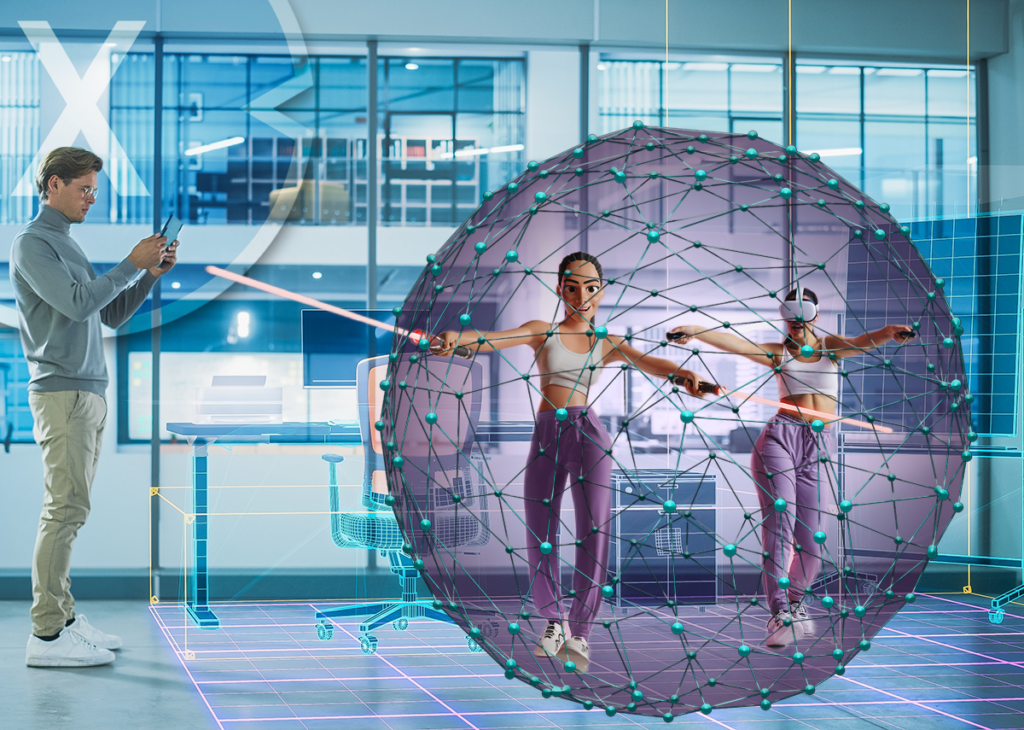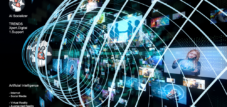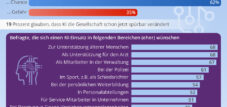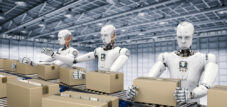Why do we need artificial intelligence? – What does this have to do with speed, flexibility, automation and scalability of the market?
Language selection 📢
Published on: December 23, 2023 / Update from: December 23, 2023 - Author: Konrad Wolfenstein

Artificial intelligence for more flexibility, automation, scalability and speed - Image: Xpert.Digital - AI & XR-3D rendering machine (art photo/AI)
🤖 Artificial intelligence in the age of change 🚀
Artificial intelligence is now an integral part of our lives and plays an increasingly crucial role in the global economy. The digital revolution has fundamentally changed the way we work, communicate and do business. The impact of this technology is far-reaching, changing the speed, flexibility, automation and scalability of companies and markets.
Speed and adaptability: The cornerstones of modern business
🏃♂️ Speed and flexibility are crucial for success in today's economy. Companies must be able to react quickly to changes and adapt their processes in real time using AI in order to remain competitive
Speed and flexibility have long been key attributes for success in the global economy. But what does that mean specifically? Companies that can react quickly and flexibly to customer requests, market trends and external influences gain a decisive advantage over the competition. Especially at a time when market conditions can change at lightning speed, timeliness is of the utmost importance. Artificial intelligence can come into play here by accelerating processes and enabling adjustments in real time.
Suitable for:
Automation and scalability: increasing efficiency through AI
🏭 As automation advances, companies can simplify their operations and adapt their market presence to changes more quickly, which in turn improves scalability and efficiency
With the advancement of automation, routine, time-consuming and labor-intensive processes have been simplified and made more efficient. Machines and algorithms take over recurring tasks, freeing up human workers and allowing them to concentrate on more complex tasks. The scalability of markets and businesses has also benefited from the introduction of artificial intelligence. Companies can now expand or contract their operations faster than ever before to adapt to changing market conditions.
The challenge of flexibility with conventional systems
🔄 Conventional systems often reach their limits when it comes to flexibility. Artificial intelligence makes it possible to make these systems more adaptable and thus react more quickly to changes
However, one disadvantage of the increasing automation and optimization of processes using conventional software is its inflexibility. As soon as conditions change, it can be difficult to adapt these complex and highly specialized systems. In such cases, only a few experts have been able to carry out the necessary modifications in a timely manner.
Nowadays, globally can be reacted to market changes. Nevertheless, unscheduled events such as the accident of the container ship “Ever Given” in 2021, which blocked the Suez channel and thereby opened the weakness of global logistics, can be relentlessly removed or quickly remedied. Interestingly, many had foreseen such a catastrophe, but were in the unclear about the exact time and the extent.
More about it here:
Self-learning systems: Reacting to unforeseen events
📊 AI systems are capable of learning from data and performing predictive analysis. This allows companies to be proactive and avoid potential crises
Artificial intelligence enables systems to be self -learning and adaptable. You recognize patterns in large amounts of data, predict trends and react independently to changes. This level of independence is crucial when it comes to reacting to unforeseen events such as the example of the “ever given”. The container ship, which ran aground in the Suez Canal in 2021 and blocked shipping traffic, clearly showed the weaknesses in global logistics. Many had predicted the potential for such a disaster, but without knowing any specific times and proportions. Artificial intelligence could have made a contribution to avoiding or at least to the faster solution of the problem by analyzing data patterns and simulation of scenarios.
The progressive development of AI now allows companies to carry out predictive analyzes and make forecasts about future events. In this way, risks are minimized and necessary measures can be initiated at an early stage. The ability of AI systems to learn from past events and apply these insights to new situations is an invaluable advantage. This makes it possible for machines to not only react, but also act proactively and help avoid crisis situations.
Suitable for:
Personalization through AI: Strengthen customer loyalty
👤 AI algorithms enable high personalization of products and services, resulting in improved customer loyalty and a better customer experience
The flexibility and adaptability of AI also benefits the personalization of products and services. AI algorithms can analyze customer preferences and make recommendations or offer tailored solutions based on them. This high level of personalization leads to closer customer loyalty and an improved customer experience, which in turn drives business success.
Efficiency and sustainability: AI as a driver for ecological responsibility
🌿 AI can help companies become more efficient and environmentally friendly by identifying potential for increasing efficiency and promoting environmentally friendly processes
Another important area of application of artificial intelligence is the identification of potential for increasing efficiency in companies. AI can help optimize processes, reduce energy consumption and use resources more effectively. In addition, artificial intelligence has the potential to increase sustainability and ecological responsibility in companies by helping to develop and implement more environmentally friendly processes.
Suitable for:
Ethical and social challenges: The responsible use of AI
👩💼 The introduction of AI poses various challenges for companies, including ethical concerns and the need to upskill employees
However, the implementation of AI systems also presents companies with challenges. The complexity of AI requires specialized knowledge, and there are ethical and societal concerns, particularly around data protection and the displacement of human workers by automation. To overcome these hurdles, it is crucial that companies invest in training their employees and develop ethical guidelines for the use of AI.
Harnessing the future of artificial intelligence
✨ Artificial intelligence holds great potential for the business world and society. It is crucial to use this potential responsibly and address the challenges
Artificial intelligence enables a quantum leap in the flexibility, automation, scalability and speed of companies and markets. It offers solutions to some of the most pressing problems of our time and at the same time opens up new perspectives for the future. However, the far-reaching benefits of AI can only be fully realized if the challenges it poses are simultaneously addressed. Artificial intelligence has the potential to not only revolutionize the business world, but also to have a positive impact on society and the environment. It is up to us to use this potential responsibly and for the benefit of all.
Suitable for:
📣 Similar topics
- 🏭 Impact of artificial intelligence on the economy and labor market
- 🌐 The role of artificial intelligence in the global economy
- ⚙️ Automation and Scalability: How AI is changing businesses
- 🔄 Flexibility in the business world: The role of artificial intelligence
- 📈 The speed of artificial intelligence: advantages for companies
- 🏢 Artificial Intelligence: From optimizing processes to adaptability
- 🧠 AI and self-learning systems: The future of enterprise adaptation
- 📊 Forecasting and predictive analysis: How AI minimizes risks
- 💡 Artificial Intelligence and Personalization: Improving the customer experience
- 🌱 Sustainability and increased efficiency thanks to artificial intelligence
#️⃣ Hashtags: #ArtificialIntelligence #Automation #Flexibility #PredictiveAnalysis #Sustainability
🎯🎯🎯 Benefit from Xpert.Digital's extensive, fivefold expertise in a comprehensive service package | R&D, XR, PR & SEM

AI & XR 3D Rendering Machine: Fivefold expertise from Xpert.Digital in a comprehensive service package, R&D XR, PR & SEM - Image: Xpert.Digital
Xpert.Digital has in-depth knowledge of various industries. This allows us to develop tailor-made strategies that are tailored precisely to the requirements and challenges of your specific market segment. By continually analyzing market trends and following industry developments, we can act with foresight and offer innovative solutions. Through the combination of experience and knowledge, we generate added value and give our customers a decisive competitive advantage.
More about it here:
🌐💡 The transformative power of artificial intelligence: examples and challenges

Why do we need artificial intelligence? Artificial Intelligence: Examples and Challenges – Image: Xpert.Digital – AI & XR 3D Rendering Machine (art photo/AI)
🩺🔬 Healthcare
Health and AI: Diagnostics and therapy at the next level
In healthcare, AI is transforming diagnostics and patient care. With adaptive algorithms that are able to learn from medical databases, diseases can be detected earlier and personalized treatment plans can be developed. Data processing time is reduced, significantly improving speed and efficiency in healthcare.
🚗🚦 Automotive industry
Autonomous driving: The revolution in mobility through AI
In the automotive industry, AI is a central component in the area of autonomous driving. Vehicles learn to perceive and interpret their surroundings and thus make safe and quick decisions on the road. This is not just in theory – practical applications are already being launched. Forward-thinking companies like Tesla are an example of integrating AI into commercial products, revolutionizing the automotive industry.
💰📈 Financial industry
Finance in the digital age: AI as decision support
AI is also becoming increasingly important in the financial industry. Algorithms analyze market conditions and can make trading decisions in a split second. There is also fraud prevention, where suspected cases can be identified and investigated more quickly.
🚜🌾 Agriculture
Sustainability through technology: The use of AI in agriculture
AI also has great potential in the area of agriculture to increase sustainability and efficiency. For example, algorithms enable farmers to create yield forecasts, optimize irrigation systems and use resources such as fertilizer in a more targeted manner. Minimizing the use of resources and maximizing returns contributes to environmental sustainability.
🏭🔄 Different industries
Cross-industry revolution: AI as a universal process optimizer
The list of industries where AI plays a role is constantly growing. From manufacturing to energy and utilities to retail, AI is being used to improve processes and increase customer satisfaction. AI helps manage inventory, predict consumer demand, and personalize marketing strategies.
🤖🔍 Social and ethical issues
AI and Society: A Double-Edged Sword
However, the integration of AI does not only result in a performance gain. There are also social and ethical questions. Automation accompanies the concern about the replacement of human work, which can lead to unemployment and social problems. In addition, the question of the transparency of decisions that are made by machines arises. The so -called “Black Box” - the opaqueness of how exactly a AI came to a decision - remains a point of the critical argument.
🔒📊 Data security and integrity
The foundation of trustworthy AI: data security and ethical principles
An additional critical aspect affects the data required for the training of AI systems. The quality and integrity of the data is crucial here, because AI systems follow the principle “Garbage in, Garbage Out”. If the data is incorrect or falsified, the results of the AI cannot be reliable. Furthermore, data protection and data security must be guaranteed in order to avoid abuse.
✊🛠️ Responsibility and transformation
Social responsibility: AI as an opportunity and challenge for companies
Companies should therefore not only concentrate on the technological aspects, but also consider the economic, social and ethical implications. The implementation of AI systems must be accompanied by policies that ensure data protection, fairness and transparency. The impact on the workforce should also be considered, with upskilling and retraining measures to ease the transition into new areas of work.
🏁🌟 Future perspective and balance
Future of AI: Balanced development for a sustainable society
AI technology is therefore not only a tool, but also a catalyst for comprehensive changes in our society and our economy. Their influence is far-reaching and profound. Companies that use artificial intelligence must be aware of their responsibilities and ensure that not only company growth, but also the general welfare is promoted.
AI represents a transformative force that enables companies to make revolutionary changes in their performance. At the same time, it brings with it a host of challenges that go far beyond the technical aspects. Both companies and society are faced with the task of using and designing this technology responsibly – in order to maximize the benefits and minimize the risks. In this new era, where AI impacts our lives in so many ways, it is critical that we gain a deeper understanding and develop a balanced perspective that promotes innovation while upholding ethical and social standards.
📣 Similar topics
- 🏥 AI in healthcare: diagnostics and personalized therapy plans
- 🚗 Autonomous driving: AI in the automotive industry
- 💰 AI in the financial industry: trading decisions and fraud prevention
- 🌾 AI in agriculture: sustainability and resource optimization
- 🏭 AI in manufacturing: process optimization and customer satisfaction
- 🔍 Ethics and Transparency: The Social Issues of AI
- 🚫 Data quality and data protection: key issues for AI systems
- 💼 Impact on the workforce: retraining and upskilling
- 🌍 AI in society: responsibility and public welfare
- 🔄 Transformative power of AI: change and risk mitigation
#️⃣ Hashtags: #AIinHealthcare #AutonomousDriving #AIinFinancialIndustry #AIinAgriculture #AIinManufacturing
🗒️ Xpert.Digital: A pioneer in the field of extended and augmented reality

We are there for you - advice - planning - implementation - project management
Xpert.Digital - Pioneer Business Development
Smart Glasses & KI - XR/AR/VR/MR industry expert
Consumer metaverse or meta -verse in general
If you have any questions, further information and advice, please feel free to contact me at any time.
I would be happy to serve as your personal advisor.
You can contact me by filling out the contact form below or simply call me on +49 89 89 674 804 (Munich) .
I'm looking forward to our joint project.
Xpert.Digital - Konrad Wolfenstein
Xpert.Digital is a hub for industry with a focus on digitalization, mechanical engineering, logistics/intralogistics and photovoltaics.
With our 360° business development solution, we support well-known companies from new business to after sales.
Market intelligence, smarketing, marketing automation, content development, PR, mail campaigns, personalized social media and lead nurturing are part of our digital tools.
You can find out more at: www.xpert.digital - www.xpert.solar - www.xpert.plus
























